

Social média : 7 tendances pour 2015. Par Barbara Chazelle, France Télévisions, Directions de la Stratégie et Prospective Netino, agence spécialisée dans la modération des espaces participatifs et la relation client numérique, a partagé durant le Hub Forum qui se tient cette semaine à Paris, sept tendances social média lourdes à suivre en 2015. 1 L'engagement Fini le temps où l'on se focalisait sur le nombre de likes ou de fans.
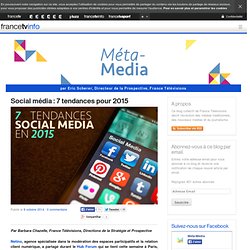
Désormais, ce qui compte, ce sont les commentaires, et les commentaires de qualité ! Le référencement naturel sur Facebook a d'ailleurs de fortes chances d'évoluer dans ce sens ; à bon entendeur donc. 2 Real Time Marketing vs. La clé, c'est de donner l'impression d'improviser. La dernière coupe du monde de football a généré un grand nombre d'exemples de real time marketing, à l'instar de ce tweet de Snickers après l'incident Luis Suarez. 3 Mettre une dose de R&D dans votre stratégie social media L'enjeu est ni plus ni moins de prendre un temps d'avance sur vos concurrents. 6 Protéger sa communauté. It’s Time for a Real Debate on Reader Privacy. Last week longtime local publisher Howard Owens, founder of the online news site the Batavian, launched a new publication covering Wyoming County in upstate New York.

Buried in a parenthetical within his welcome message to readers was a fascinating promise: “We’ll also respect your privacy by not gathering personal data to distribute to multinational media conglomerates for so-called ‘targeted advertising.’” This kind of explicit promise regarding reader privacy is increasingly important and all too rare. Even though stories about government surveillance, commercial tracking and financial data theft have become commonplace in the press over the last two years, news organizations are still loath to talk about their own practices in regards to reader privacy. Introducing Save on Facebook. By Daniel Giambalvo, Software Engineer Every day, people find all sorts of interesting items on Facebook that they don’t have time to explore right away.
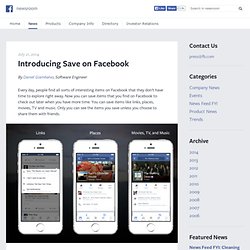
Now you can save items that you find on Facebook to check out later when you have more time. You can save items like links, places, movies, TV and music. Only you can see the items you save unless you choose to share them with friends. Save Once, View Anywhere You can view the items you saved at any time by going to your saved items in the “More” tab on mobile or by clicking the link on the left hand side of Facebook on the web. Introducing Save on Facebook. Introducing Save on Facebook. News Feed FYI: Showing More Timely Stories from Friends and Pages. News Feed FYI: Showing More Timely Stories from Friends and Pages. Many users are outraged at the idea that Twitter might use an algorithm to filter their feeds. A post we published at Gigaom on Thursday morning seems to have triggered a kind of flash fire in the Twitter-sphere.
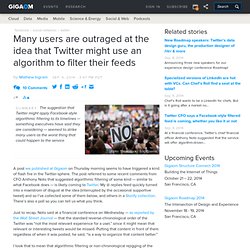
The post referred to some recent comments from CFO Anthony Noto that suggested algorithmic filtering of some kind — similar to what Facebook does — is likely coming to Twitter. The Guardian wants to know what you think of its redesign. The complaints came rolling in shortly after The Guardian released a beta version of its new responsive website: The comments are too difficult to use.
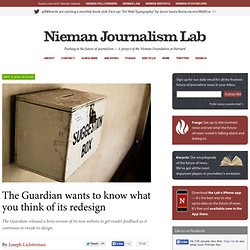
There isn’t enough information on the homepage. Even the font on the articles is too big. The Guardian has been developing the site for more than a year, but the beta version was released publicly in February. By the end of March, The Guardian had received more than 5,000 comments from readers; some positive, but many suggesting tweaks or complaining about problems. What could News Corp learn from successful news mobile apps as it targets 'millennials'? The Financial Times claims that “people familiar with the situation” say News Corp is planning the development of an app which will mix content from News Corp titles with other articles specifically edited for the purpose.

It will be aimed directly at "millennials". According to Pew, 79% of American 18-24 year-olds possess smartphones, and while almost all of them are prolific users of other apps such as messaging service Whatsapp or social photo-sharing chat app Snapchat, few access traditional news apps. When News Corp's early failed app publishing experiment The Daily closed, the reason given in a corporate statement was that the firm “could not find a large enough audience quickly enough to convince us the business model was sustainable in the long-term”. So, as News Corp reportedly considers a foray into the territory, what could they learn from those mobile news apps which have experienced success?
Revenue Functionality and appearance. Why publishers just say no to content-recommendation ads - Digiday. Content-recommendation widgets are everywhere online these days, but not every publisher is going crazy over them.
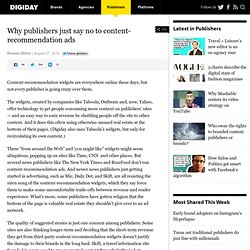
The widgets, created by companies like Taboola, Outbrain and, now, Yahoo, offer technology to get people consuming more content on publishers’ sites — and an easy way to earn revenue by shuttling people off the site to other content. Researchers are cracking text analysis one dataset at a time. Google on Monday released the latest in a string of text datasets designed to make it easier for people outside its hallowed walls to build applications that can make sense of all the words surrounding them.
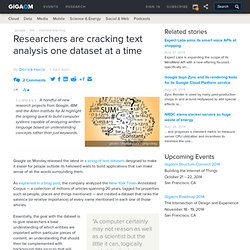
As explained in a blog post, the company analyzed the New York Times Annotated Corpus — a collection of millions of articles spanning 20 years, tagged for properties such as people, places and things mentioned — and created a dataset that ranks the salience (or relative importance) of every name mentioned in each one of those articles. Essentially, the goal with the dataset is to give researchers a base understanding of which entities are important within particular pieces of content, an understanding that should then be complemented with background data sources that will provide even more information.
For example, in an article about NBA coach Becky Hammon, the blog post’s authors explain: Source: IBM / Baylor College of Medicine. Free Language Lessons for Computers. This Week in Review: Twitter and press intimidation in Ferguson, and a journalist’s brutal execution. How a Norwegian public radio station is using Snapchat to connect young listeners with news. In 2011, the Norwegian public broadcaster NRK set the world record for the longest single television show by broadcasting a cruise ship traversing the country’s coast.
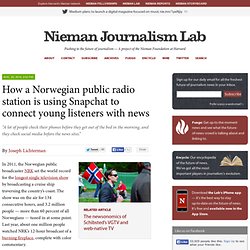
The show was on the air for 134 consecutive hours, and 3.2 million people — more than 60 percent of all Norwegians — tuned in at some point. Last year, about one million people watched NRK’s 12-hour broadcast of a burning fireplace, complete with color commentary. But NRK P3, one of the broadcaster’s radio stations aimed at a younger audience, has taken a more ephemeral approach to broadcasting this summer, producing newscasts for Snapchat. The station has about 2,500 followers on its Snapchat account, Even Nielsen, a P3 producer told me via email. The Future of Mobile Apps for News. The modern smartphone is 7 years old and yet, when it comes to designing mobile applications, we are still barely scratching the surface.
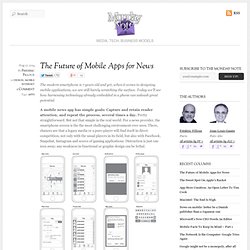
Today we’ll see how harnessing technology already embedded in a phone can unleash great potential. A mobile news app has simple goals: Capture and retain reader attention, and repeat the process, several times a day. Pretty straightforward. Cloze - Apps to connect with the people that matter most. Defineed - coming soon. Newskdd2014_submission_4.pdf. Newskdd2014_submission_10.pdf.
TweetDeck. Social bookmarking for introverts. What Happens to #Ferguson Affects Ferguson: — The Message. The future of content consumption, through the eyes of Yahoo Labs. After years struggling through a public identity crisis it appears Yahoo has decided, for better or worse, that it’s a content company. There will be no Yahoo smartphones or operating systems, no Yahoo Fiber, and no Yahoo drones, robots or satellites. But that doesn’t mean the company can’t innovate. When it comes to the future of web content, in fact — how we’ll find it, consume it and monetize it — Yahoo might just have the inside track on innovation. Why you can no longer expect that the news will find you. One of the more frustrating things about turning into a cranky old editor (although to be honest I was That Guy when I was 25) has been watching a generation of young people embrace the notion that they don’t have to be savvy news consumers: that any news that is truly important will be circulated by their inner circles through social media.
Editorial Analytics: The Missing Link in Monetization. This is a guest post by Uyen Tieu, the co-founder and CRO of Rumble. She is a seasoned executive in figuring out how media companies make money and how they morph onto new platforms. Uncovering Algorithms: Looking Inside the Facebook News Feed. July 22nd, 2014 at 12:30pm ETBerkman Center for Internet & Society, 23 Everett St, 2nd FloorRSVP required for those attending in person via the form belowThis event will be webcast live (on this page) at 12:30pm ET Our online lives are organized by computer algorithms that select and recommend advertisements, search results, news, and online social interactions.
These algorithms are often closely-guarded secrets kept by Internet companies, but researchers, users, and the public might legitimately need to know how these algorithms operate. Algorithm [draft] [#digitalkeywords] Algorithm [draft] [#digitalkeyword] Q&A: Tarleton Gillespie says algorithms may be new, but editorial calculations aren’t. Why you can no longer expect that the news will find you. Recommendation Engines Have Killed Discovery. Recommendation Engines are Critical to the Future of Content Discovery. 26 Free (or Free-to-Try) Content Curation Tools - SEW. Multicast » Blog Archive » Corrupt Personalization. Rage Against the Algorithms - Nicholas Diakopoulos. Interviewing the algorithm: How reporting and reverse engineering could build a beat to understand the code that influences us.
78524_Tow-Center-Report-WEB-1.pdf. Strictly algorithm: how news finds people in the Facebook and Twitter age. From Spotify and Netflix recommendations to Facebook’s news feed or Google’s search results, algorithms play a pivotal role in our media consumption. Presentation - pugmarks-user-introduction.pdf. Gravity - Personalizing the Internet. Contextly Launches Its Editorial Tools To Find “Related Content” That’s Actually Related. Facebook wants to be a newspaper — meet the new boss, same as the old boss. Man vs. Algorithm: When Media Companies Need a Human Touch.
Betaworks' Vision For the Future of Online News. L’ADN journalistique, cet étrange algorithme rebelle. It’s Time To Reinvent The News App. Affinités prédictives : des algorithmes et des hommes. Eli Pariser nous met en garde contre "les bulles de filtres" en ligne. How to Burst the "Filter Bubble" that Protects Us from Opposing Views. How news sites are boosting 'stickiness' with personalisation. How algorithms decide the news you see. Watching the audience move: A New York Times tool is helping direct traffic from story to story.